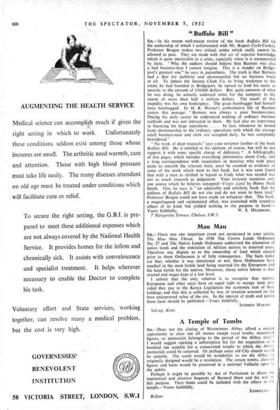" Buffalo Bill "
SIR,—In his recent well-meant review of the book Buffalo Bill (in the authorship of which I collaborated with Mr. Rupert Croft-Cooke),
Professor Brogan makes two critical asides which really cannot be allowed to pass. They are made with that air of superior knowledge which is quite intolerable in a critic, especially when it is unsupported by facts. " Why the authors should believe that Barnum was also a bad business-man I cannot imagine. This is a slander on Bridge- port's greatest son," he says in parenthesis. The truth is that Barnum had a flair for publicity and showmanship but no business brain at all. To induce the Jerome Clock Co. to bring workmen to the estate he had founded at Bridgeport, he agreed to lend his name as security to the amount of 110,000 dollars. But, quite unaware of what he was doing, he actually endorsed notes for the company to the extent of more than half a million dollars. The result of this stupidity was his own bankruptcy. The great humbugger had himself been humbugged. In. M. R. Werner's authoritative life of Barnum occurs this passage: " Barnum was always a poor business-man. During his early career he understood nothing of ordinary business methods and was not interested in them. He had also no experience in financing his large operations. . . . In fact, whenever he turned from showmanship to the ordinary operations with which the average small business-man and clerk are occupied daily, he was completely bewildered."
" No work of deep research," says your reviewer further of the book Buffalo Bill. He is entitled to his opinion, of course, but will he not support it with some specific charge of deficiency ? A bibliography of five pages, which includes everything informative about Cody, and a long correspondence with researchers in America who took great pains to unearth the relevant facts, must be counted as evidence of some of the work which went to this book, but it was soon found that with a man as clothed in legend as Cody what was needed was not so much research as judgement. Your reviewer mentions only one source which he believes untapped—Virgin Land by Henry Nash Smith. This, he says, is " an admirable and scholarly book that the authors of Buffalo Bill do not cite and do not seem to have read." Professor Brogan could not have made an unluckier shot. The book, a magniloquent and opinionated affair, was examined with countless others of its kind, but yielded nothing to the purpose in hand:—


































 Previous page
Previous page